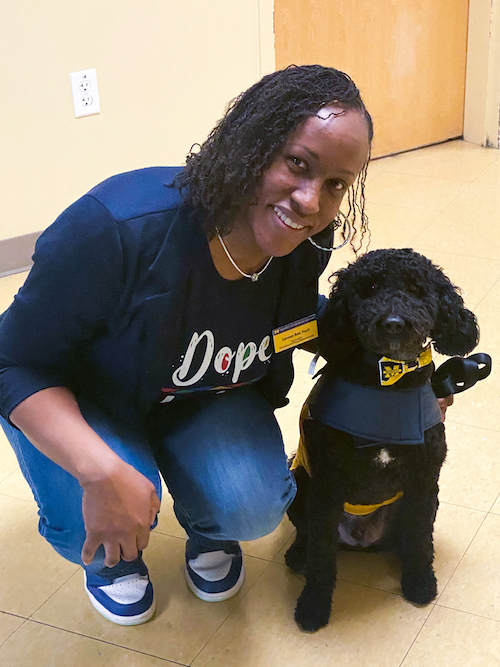This year’s State of the University event featured a diverse lineup of guests, though we’ll forgive you if all you remember a year from now is it was the day you met Moses. The debut of Counseling and Psychological Services’ new therapy dog drew plenty of “awwwws,” and the laid-back black goldendoodle handled the resulting onslaught of hands-on affection in stride. Since Moses’ introduction, CAPS Director Sara Byczek says the enthusiasm hasn’t subsided. “I had no idea how popular he’d be,” she says. “The day he was on social media, people were stopping by, asking ‘Where's Moses? Can I get an appointment with Moses?’ People just really relate to dogs, and it’s obviously great to see this is a new way to reduce stigma and help people come in the door.”
While Byczek loves that people are excited about Moses — and the spotlight he seems to be drawing to mental health — it’s important to remember that he is a working dog. Moses’ role as a therapy dog means that most of his time on campus will be spent interacting with CAPS clients in confidential, private therapy sessions. CAPS Counselor Carmen Bell, who is Moses’ caregiver and handler, says he received specialized training designed to make him a valuable therapeutic partner for folks dealing with trauma, anxiety or stress. “Moses is super chill and soft and fluffy, and he loves cuddling,” Bell says. “The idea with using a dog in a therapy session is that someone would get to cuddle and hold him, and that would help them feel comforted and centered as they talk about their trauma or anxiety.”
Moses' official role means that he’s not really available for appointments or drop-in cuddle sessions that don't have an explicit therapeutic purpose. But that doesn’t mean there won’t be opportunities for the broader campus community to interact with him. Bell says that if you see Moses out and about, talking a walk, it’s totally OK to say hi, though if you notice he’s wearing his red therapy dog vest, that means he’s on the clock and heading to an appointment. The CAPS team is also planning to have Moses attend campus events with a mental health component, like the end-of-semester exam cram sessions at the library or Take Back the Night, where survivors of sexual or relationship violence often share intimate stories. “In settings like that, we think Moses could bring a lot of comfort to people and help reduce stress,” Byczek says.

A couple more fun facts about Moses:
- The 15-month-old pup is a goldendoodle, which is a golden retriever and poodle hybrid breed known for their smarts, affectionate personality and (mostly) hypoallergenic coats. But you may have noticed that Moses is black — not golden — owing to his poodle heritage. Bell said she specifically sought out a chocolate or black dog, due to the stigma associated with pets with darker colorations.
- Bell chose Moses because he was the chillest of the litter. “When we went to the breeder to check him out, a lot of the puppies were running around playing, another dog peed on the carpet, and Moses was just sitting there very relaxed. We looked at him and he laid down and then he fell asleep, so I knew he was the one. That’s the kind of temperament you want in a therapy dog.”
- Bell named Moses after the prophet who features prominently in Judaism, Christianity, Islam and other faiths. “In the Bible, Moses helps set people free from bondage, and Moses the therapy dog is going to help set people free from emotional bondage.”
###
Story by Lou Blouin




